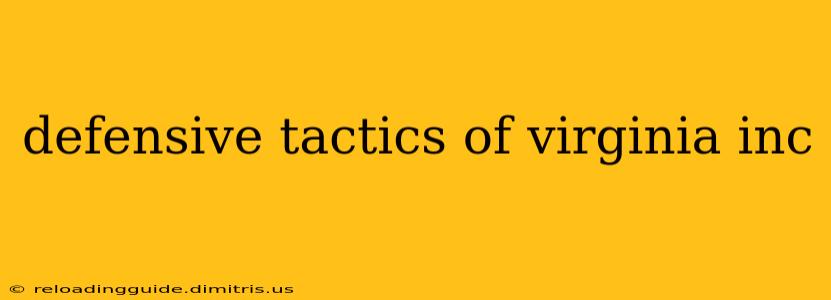Virginia, a state known for its business-friendly environment, offers corporations a range of defensive tactics to protect their assets and interests. Understanding these strategies is crucial for businesses operating in or considering incorporating in the Commonwealth. This analysis delves into the key legal and corporate mechanisms employed by Virginia Inc. to minimize liability and withstand legal challenges.
Key Defensive Tactics Employed by Virginia Businesses
Virginia's legal framework provides several avenues for corporations to fortify their defenses. These include:
1. Strategic Corporate Structure:
- Limited Liability Companies (LLCs): LLCs offer a popular structure due to their liability protection. Members' personal assets are generally shielded from business debts and lawsuits. However, the level of protection can vary depending on the LLC's operating agreement and the nature of the claim. Careful drafting of the operating agreement is crucial for maximizing this protection.
- S Corporations: This structure allows eligible businesses to avoid double taxation (corporate and personal income tax) by passing corporate income directly to shareholders. This can be a significant advantage in minimizing tax liabilities, a powerful defensive strategy in itself.
- C Corporations: While subjected to double taxation, C corporations offer the strongest liability protection, separating the personal assets of shareholders from the corporation's liabilities. They are often preferred for larger, more complex businesses.
2. Robust Contractual Agreements:
- Indemnification Clauses: These clauses in contracts shift the responsibility for losses or damages to another party, reducing the corporation's potential liability. They are commonly used in business partnerships, vendor agreements, and employment contracts. It's vital to ensure these clauses are legally sound and enforceable.
- Limitation of Liability Clauses: These clauses aim to restrict the potential amount of damages a corporation can be held responsible for. However, the enforceability of these clauses varies by jurisdiction and the nature of the claim.
- Arbitration Clauses: These clauses mandate that disputes be resolved through arbitration rather than traditional litigation. Arbitration can often be faster, cheaper, and more confidential than court proceedings, providing a significant defense mechanism.
3. Intellectual Property Protection:
- Patents, Trademarks, and Copyrights: Protecting intellectual property through registration provides a strong defense against infringement and unauthorized use. This not only prevents financial losses but also safeguards the corporation's brand reputation and market position.
- Trade Secret Protection: For confidential business information not eligible for patents, trademarks, or copyrights, robust measures to protect trade secrets are vital. These include non-disclosure agreements and secure data management practices.
4. Risk Management and Compliance:
- Insurance Coverage: Comprehensive insurance policies, including liability insurance, are crucial for mitigating risks and covering potential losses from lawsuits or accidents. Adequate coverage is a cornerstone of a strong defensive strategy.
- Compliance Programs: Maintaining rigorous compliance programs for relevant laws and regulations (e.g., environmental regulations, employment laws) helps prevent legal issues and reduce liability. A strong compliance program demonstrates due diligence and can be a powerful defense in court.
Navigating the Legal Landscape
The specifics of defensive strategies will depend on the nature of the business, its industry, and the potential risks it faces. Seeking advice from experienced legal counsel in Virginia is crucial to develop a comprehensive and effective defense strategy tailored to the individual circumstances of the corporation. Understanding the nuances of Virginia's legal framework is paramount for businesses seeking to establish a robust and resilient corporate shield. This proactive approach can significantly reduce the risk of costly litigation and protect the long-term viability of Virginia Inc.

